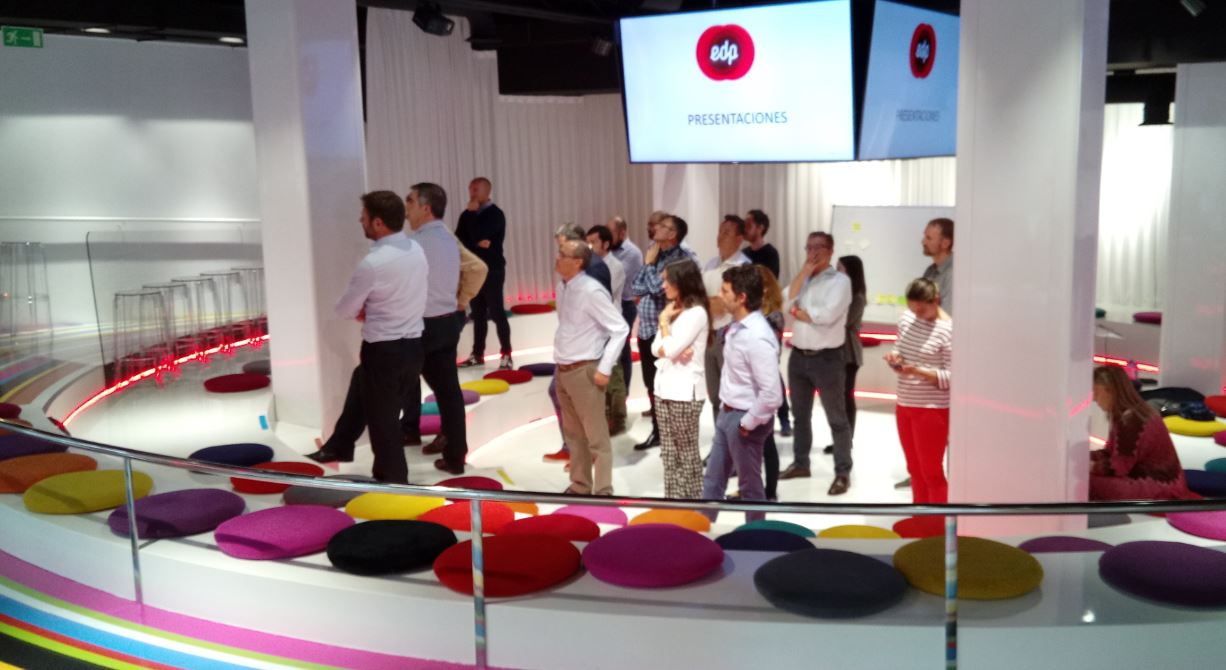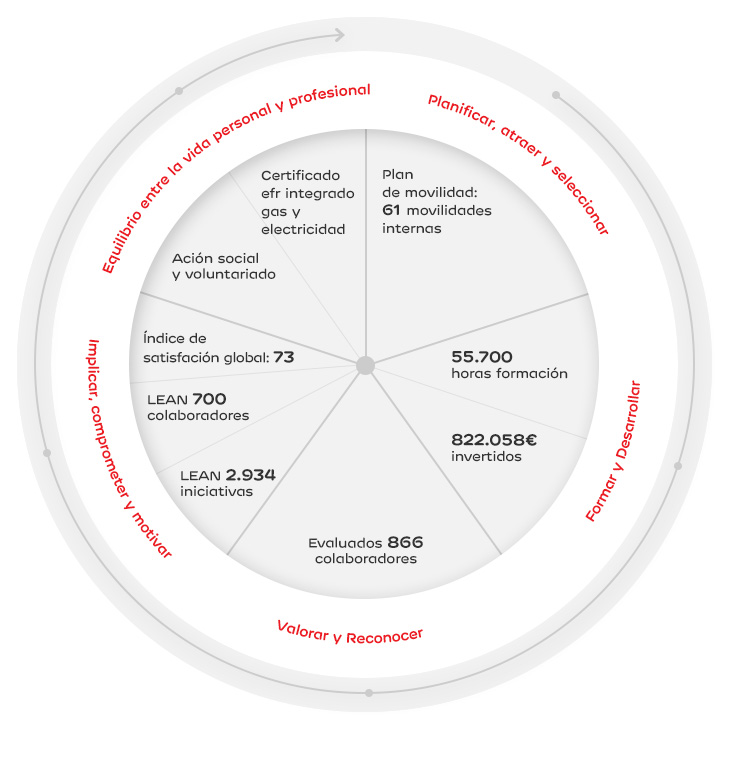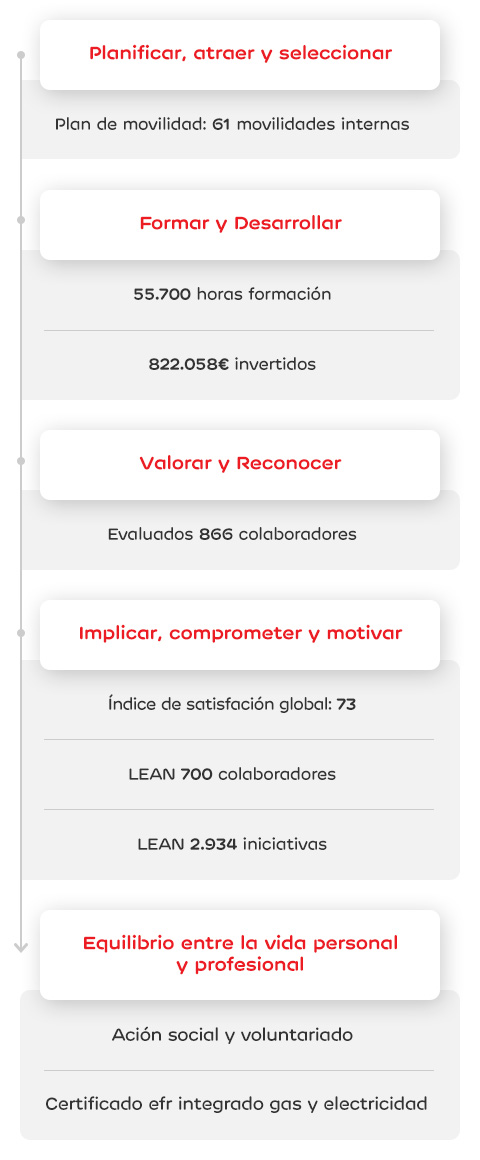Committed to its stakeholders, EDP carries out several projects, which include: cultural activities in a wide range of centers and organizations; environmental activities to improve the environment that surrounds us; sports activities to promote healthy lifestyles; and social work activities. Many such activities involve the employees themselves, through a volunteer program, in coordination with the EDP Foundation, which is responsible for strengthening the company’s commitment to sustainable development in the regions where it operates.

Managing stakeholders is a demanding endeavor, requiring companies to be transparent and open to dialogue in their relationship to society, and particularly with organizations that influence or are influenced by its activities.
Such management approach allows EDP Spain to detect relevant stakeholders, understand their relationship expectations and identify challenges, risks and improvement opportunities, thereby integrating them into the company’s strategy.
To strengthen the consistency of the relationship between EDP Spain and its stakeholders, two instruments have been defined: the EDP Group’s Stakeholders Policy, and a segmentation model that has allowed us to identify four broad stakeholder categories:
Market,
Value Chain,
Democracy,
Social and Territorial Organization.

Segmentation model
The segmentation model is organized around three axes that allow us to group stakeholders into four categories based on their different interests and characteristics:
The first axis is built around the implementation of the company’s activities, i.e. the activities and processes that allow us to deliver electricity, gas and energy services to our customers. It therefore defines the first category, which comprises the stakeholders we call the Value Chain. This category is comprised of:
Customers, who play an increasingly active role in the demand for new products and services.
Employees, whose performance enables the implementation of the company’s strategy and the fulfillment of its economic, social and environmental sustainability commitments.
Suppliers. EDP Spain’s current management model opts for outsourcing non-strategic activities, enabling the optimization of internal resources and the coordination of activities within the EDP group. A network is thus established, comprising all partnering companies, which makes it one of the stakeholders identified by EDP Spain.
The Scientific Community, as a source of innovation for new energy products and services.
The second axis refers to the direct context that frames and defines the conditions in which EDP develops its activities and materializes its investments: regulations, competition, funding conditions, regulatory decisions, public policies… In an energy sector defined by high levels of financial uncertainty and regulatory risk, two categories are defined:
The Market, comprising investors, financial institutions and competitors that either facilitate or hinder the implementation of the company’s investment, internationalization and diversification strategies or activities (link to shareholders section)
Democracy, which comprises the actors who define and adjust market rules, either facilitating or hindering the implementation of the activities pursued by the different players. The Government, Government Agencies and Regulatory Authorities, together with the Parliament, Political Parties and International Institutions, monitor the activity of companies and markets.
The third axis refers to the social and territorial context where EDP operates. These activities generate direct, indirect and induced effects, which can be of economic, social and environmental nature. This category groups the following stakeholders:
Local Communities: EDP Spain favors a social and territorial development model based on sustainable growth, producing a dynamic economic effect in the regions and municipalities where it operates
City Councils of the territories where EDP’s relevant investments are located recognize the company as a driver for their own regional development processes, with expectations for sustainable economic and social progress.
Civil society organizations, particularly NGOs, establish a critical framework that influences the implementation of the Group’s activities; EDP Spain fosters collaboration with NGOs that share its key values, in a process coordinated by the EDP Foundation.
The Media and Opinion Leaders, which discuss and analyze the Group’s most important projects in Spain.

Aware of the importance of efficient HR management, EDP has implemented a model for the development of human capital, focused on making EDP the best place to work. This model begins with staff selection itself and continues with the company’s investment on the development and training of our workers, as well as on the management of their performance, without losing sight of the balance between personal and professional life.
Such balance is ensured by Collective Bargaining Agreements, which regulate labor relations between EDP Group companies and their workers, thereby ensuring a stable working environment.
Furthermore, EDP knows that people are the key to success; therefore, all members of the EDP team are involved in the company’s mission and objectives. With everyone’s knowledge and suggestions, we improve our performance on a daily basis. To do this, EDP Spain launched the Lean program back in 2006.
Lean is a way of working that pursues the continuous improvement of corporate activities by inviting workers to create solutions and eliminate useless or ineffective tasks, such as: waiting periods (ineffective job scheduling), unnecessary consumption (auxiliary equipment, fuel), reprocessing (recurrent malfunctions), unnecessary misplacements (storing tools or materials away from the locations where they are used), unnecessary activities (duplicated tasks).
On the other hand, EDP is committed to the continued strengthening of occupational safety and health; we have therefore implemented a prevention policy to ensure that both employees and suppliers implement all occupational risk prevention measures required by EDP, with the goal of achieving ZERO ACCIDENTS.


Current legislation determines that vulnerable consumers are entitled to a so-called Social Bonus, which amounts to a 25% reduction on the PVPC (Voluntary Price for Small Consumers). But EDP Spain is firmly committed to the protection of vulnerable consumers and has decided to go beyond legal requirements, thus honoring its solidarity and community service principles.
For this reason, the company has voluntarily signed specific agreements with all Public Organizations that have shown an interest in extending the protection accorded to vulnerable consumers.
The aim of these Agreements is to avoid the suspension of electricity and/or natural gas supply when vulnerable consumers fail to pay certain bills, or to promptly restore it if the suspension has already been implemented, under the social benefits that such Public Organizations will award to the Grantee for the payment of of those bills.
Hence, either through these Agreements or through specific regional laws, 95% of EDP Spain customers are entitled - if in a vulnerable situation - to request the suspension of the cut-off while the corresponding welfare payments are being processed.
Additionally, EDP provides energy saving and efficiency advice in order to maximize the savings of all customers who request it.

The Mission of the EDP Foundation is to strengthen the commitment of the EDP Group in the regions where it operates, with a special focus on educational, cultural, social and environmental aspects, as part of a wider sustainable development approach where efficient and responsible energy production and use play a critical role.
Social Commitment
EDP Foundation
Based on its current responsibilities, the EDP Foundation aims at “being a Foundation that engages with local communities, driving change to achieve sustainable societal development.”
